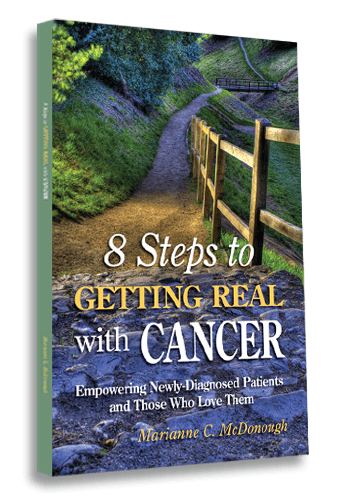8 Steps to Getting Real with Cancer

Every day my mind functioned like a Whac-a-Mole board. So many questions! I'd start to answer one, and another would pop up. Meanwhile, my emotions veered from disempowerment to anger to confusion and so many others. Decisions, stress, mortality? So many dilemmas, and, possibly, not a lot of time.
When I stepped into survivorship, I realized I wanted to share what I learned. So I divided my first book into eight chapters (steps) to coincide with the hard questions I had asked myself, such as:
What do I know about cancer and believe to be true about myself as a cancer patient?
How should I interact and relate to my family, friends, and medicall providers?
How do I evaluate and choose the best treatment protocols?
What do I believe about my own mortality?
Where is God in all of this?
What am I afraid of?
How do I deal with all the stress? Cancer reeks of stress!
Do I dare hope for a future? Will I ever be "normal" again?
My oncology center's instructions warned that people who don't address and communicate their emotions and concerns are likely to experience substantial depression post treatment. I understand that it's tempting to bury all those kinds of things for whatever reason (personality, not wanting to burden others, feeling awkward about being "selfish") but, as odd as it may feel, you are your number one concern right now. I hope this book will help guide you through a strong treatment and prepare you for a healthy recovery and survivorship!
Reviews
27th Annual Writer’s Digest Self-Published Book Awards
8 Steps to Getting Real with Cancer: Empowering Newly-Diagnosed Patients and Those Who Love Them by Marianne McDonough
8 Steps to Getting Real with Cancer: Empowering Newly-Diagnosed Patients and Those Who Love Them by Marianne McDonough
The first few weeks after a cancer diagnosis can feel like complete chaos. A kaleidoscope of emotions whirls around a core feeling of shock, and the volume of incoming information can be overwhelming. In 8 Steps to Getting Real with Cancer, Marianne C. McDonough gives practical and compassionate advice that shows how being honest and adopting a “survivor’s attitude” from the very start can help immensely in dealing with this crisis. (read more)
8 Steps to Getting Real with Cancer: Empowering Newly-Diagnosed Patients and Those Who Love Them by Marianne McDonough
BlueInk Review
8 Steps to Getting Real with Cancer: Empowering Newly-Diagnosed Patients and Those Who Love Them by Marianne McDonough
Kirkus Review
8 Steps to Getting Real with Cancer: Empowering Newly-Diagnosed Patients and Those Who Love Them by Marianne McDonough
In this debut guide to thriving through a cancer diagnosis and the healing process, the author gives intimate, friendly, and firm advice about handling family, medical providers, fear, and decision-making. Cancer can shock and rattle even the strongest of families, and McDonough is no stranger to the changes that take place immediately after the diagnosis is delivered. In her guide, the author reaches out to readers grappling with their own struggles and offers focus points in the form of myths and truths. (read more)
